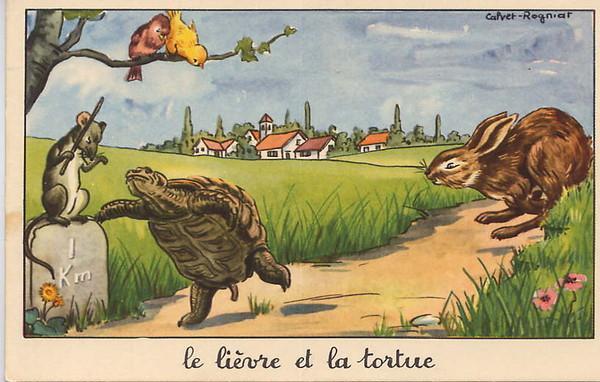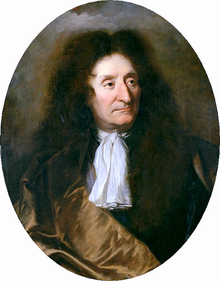“Slow and steady wins the race” from “The Hare and the Tortoise”
The words of wisdom from fables that were written over 2 millennia ago have permeated into common everyday expressions. Ever heard of “quality, not quantity”? It derives from the fable “The Lioness and the Vixen”; “Honesty is the best policy” from “Mercury and the Woodsman”; “Don’t count your chickens before they have hatched” from “The Milkmaid and her Pail”; “Don’t make much ado about nothing” from “The Mountain in Labour”.
Fables or fictional stories are told with anthropomorphized animals illustrating a particular moral lesson. The original volumes were issued by Jean de La Fontaine between 1668 to 1694. The ‘Fables of Fontaine’ is part of classic French literature, consisting of 12 books and 239 fables. They were adapted from fabulists such as Babrius, Phaedrus, Aesop, Horace, Avienus and earlier writers like Clément Morat, Mathurin Régnier and many more. The fables were initially intended for a mature audience but later were adopted by the eductation system to teach children moral lessons.
Jean de La Fontaine
[ʒɑ̃ də la fɔ̃tɛn]; 8 July 1621 – 13 April 1695) was a famous French fabulist and one of the most widely read French poets of the 17th century. He is known above all for his Fables, which provided a model for subsequent fabulists across Europe and numerous alternative versions in France, and in French regional languages.
“Le Corbeau Et Le Renard” de Jean De La Fontaine
Maître Corbeau sur un arbre perché,
Tenait en son bec un fromage.
Maître Renard par l’odeur alléché
Lui tint à peu près ce langage :
Et bonjour, Monsieur du Corbeau.
Que vous êtes joli ! que vous me semblez beau !
Sans mentir, si votre ramage
Se rapporte à votre plumage,
Vous êtes le Phenix des hôtes de ces bois.
À ces mots le Corbeau ne se sent pas de joie :
Et pour montrer sa belle voix,
Il ouvre un large bec, laisse tomber sa proie.
Le Renard s’en saisit, et dit : Mon bon Monsieur,
Apprenez que tout flatteur
Vit aux dépens de celui qui l’écoute.
Cette leçon vaut bien un fromage sans doute.
Le Corbeau honteux et confus
Jura, mais un peu tard, qu’on ne l’y prendrait plus.
“The Crow And The Fox” by Jean De La Fontaine
Master Crow perched on a tree,
Was holding a cheese in his beak.
Master Fox attracted by the smell
Said something like this:
“Well, Hello Mister Crow!
How pretty you are! How beautiful you seem to me!
I’m not lying, if your voice
Is like your plumage,
You are the phoenix of all the inhabitants of these woods.”
At these words, the Crow is overjoyed.
And in order to show off his beautiful voice,
He opens his beak wide, lets his prey fall
The Fox grabs it, and says: “My good man,
Learn that every flatterer
Lives at the expense of the one who listens to him.
This lesson, without doubt, is well worth a cheese.”
The Crow, ashamed and embarrassed,
Swore, but a little late, that he would not be taken again.
To read more fables in French, click here.
If you want more….here is a list linking to individual Wikipeida articles of fables with explanation and analysis:
- The Acorn and the Pumpkin (Le gland et la citrouille, IX.4)
- The Ant and the Grasshopper (La cigale et la fourmi, I.1)
- The Ass and his Masters (L’âne et ses maitres, VI.11)
- The Ass Carrying Relics (L’âne portant des reliques, V.14)
- The Ass in the Lion’s Skin (L’âne vêtu de la peau du lion, V.21)
- The Astrologer who Fell into a Well (L’astrologue qui se laisse tomber dans un puits, II.13)
- The Bear and the Gardener (L’ours et l’amateur des jardins, VIII.10)
- The Bear and the Travelers (L’ours et les deux compagnons, V.20)
- The Belly and the Members (Les membres et l’estomac, III.2)
- The Bird Wounded by an Arrow (L’oiseau blessé d’une flèche, II.6)
- The cat and an old rat (Le chat et un vieux rat, III.18)
- The cat turned into a woman (La chatte métamorphosée en femme, II.18)
- The coach and the fly (Le coche et la mouche, VII.9)
- The Cobbler and the Financier (Le savetier et le financier, VIII.2)
- The cock and the fox (Le coq et le renard, II.15)
- The cock and the pearl (Le coq et la perle, I.20)
- Death and the woodman (La Mort et le bûcheron, I.16)
- The Dog and its Reflection (Le chien qui lâche sa proie pour l’ombre, VI.17)
- The Dog and the Wolf (Le loup et le chien, I.5)
- The dog who carries his master’s dinner round his neck (Le chien qui porte à son cou le dîner de son maître, VIII/7)
- The Dove and the Ant (La colombe et la fourmi, II.12)
- The drowned woman and her husband (La femme noyée, III.16)
- The Eagle and the Beetle (L’Escarbot et l’aigle, II.8)
- The earthen pot and the iron pot (Le pot de terre et le pot de fer, V.2)
- The Farmer and his Sons, (Le laboureur et ses enfants, V.9)
- The Farmer and the Viper (Le villageois et le serpent, VI.13)
- The fish and the flute-playing shepherd (Les poissons et le berger qui joue de la flûte, X.11)
- The fisherman and the little fish (Le petit poisson et le pêcheur, V.3)
- The Forest and the Woodcutter (La forêt et le bûcheron, X11.16)
- The fox and the bust (Le renard et le buste, IV.14)
- The fox and the crow (Le corbeau et le renard, I.2)
- The Fox and the Grapes (Le renard et les raisins, III.11)
- The Fox and the Sick Lion (Le lion malade et le renard, VI.14)
- The Frog and the Mouse (La grenouille et le rat, IV.11)
- The Fox and the Stork (Le renard et la cigogne, I.18)
- The Frog and the Ox (La grenouille qui veut se faire aussi grosse que le boeuf, I.3)
- The Frogs Who Desired a King (Les grenouilles qui demandent un roi, III.4)
- The Girl (La Fille, VII.5), see under The Heron and the Fish
- The Goose that Laid the Golden Eggs (La Poule aux oeufs d’or, V.13)
- The Lion Grown Old, (Le lion devenu vieux, III.14)
- The heifer, the goat and the sheep in company with the lion (La génisse, la chèvre et le brebis en société avec le lion, I.6)
- The Heron, (Le Héron, VII.4)
- The Horse and the Donkey (Le cheval et l’âne, VI.16)
- The jay dressed in peacock feather (Le geai paré des plumes du paon, IV.9)
- The kite and the nightingale (Le milan et le rossignol, IX.17)
- The Lion and the Mouse (Le lion et le rat, II.11)
- The Lion in Love (Le lion amoureux, IV.1)
- The man and the wooden idol (L’homme et l’idole de bois, IV.8)
- The Man who Runs after Fortune (L’homme qui court après la fortune et l’homme qui l’attend dans son lit, VII.12)
- The Man with two Mistresses (L’homme entre deux âges et ses deux maîtresses, I.17)
- The Mice in Council (Conseil tenu par les rats, II.2)
- The Milkmaid and Her Pail (La laitière et le pot au lait, VII.10)
- The miller, his son and the donkey (Le meunier, son fils, et l’âne, III.1)
- The miser who lost his treasure (L’avare qui a perdu son trésor, IV.20)
- The Monkey and the Cat (Le singe et le chat, IX.17)
- The Mountain in Labour (La montagne qui accouche, V.10)
- The Mouse and the Oyster (Le rat et l’huître, VIII.9)
- The Mouse Turned into a Maid (La souris métamorphosée en fille, IX.7)
- The Oak and the Reed (Le chêne et le roseau, I.22)
- The Old Cat and the Young Mouse (Le vieux chat et la jeune souris, XII.5)
- The Old Man and his Sons (Le vieillard et ses fils, IV.18)
- The Old Man and the Ass (Le vieillard et l’âne, VI.8)
- Phoebus and Boreas (Phébus et Borée, VI.3)
- The thieves and the ass (Les voleurs et l’âne, I.13)
- The torrent and the river (Le torrent et la rivière, VIII.23)
- The sun and the frogs (Le soleil et les grenouilles, VI.12, XII.24)
- The swan and the cook (Le cygne et le cuisinier, III.12)
- The Tortoise and the Birds (La tortue et les deux canards, X.3)
- The Tortoise and the Hare (Le lièvre et la tortue, VI.10)
- The Town Mouse and the Country Mouse (Le rat de ville et le rat des champs, I.9)
- The treasure and the two men (Le trésor et les deux hommes, IX.15)
- The Two Pigeons (Les deux pigeons, IX.2)
- The weasel in a granary (La belette entrée dans un grenier, III.17)
- The Wagoner Mired (Le charretier embourbé, VI.18)
- The Wolf and the Crane (Le loup et la cigogne, III.9)
- The Wolf and the Lamb (Le loup et l’agneau, I.10)
- The wolf who played shepherd (Le loup devenu berger, III.3)
- The Women and the Secret (Les femmes et le secret, VIII.6)
- The woodcutter and Mercury (Le bûcheron et Mercure, V.1)
- The Young Widow (La jeune veuve, VI.21)
Photo source and information: Wikipédia and short-stories-for-kids.com



